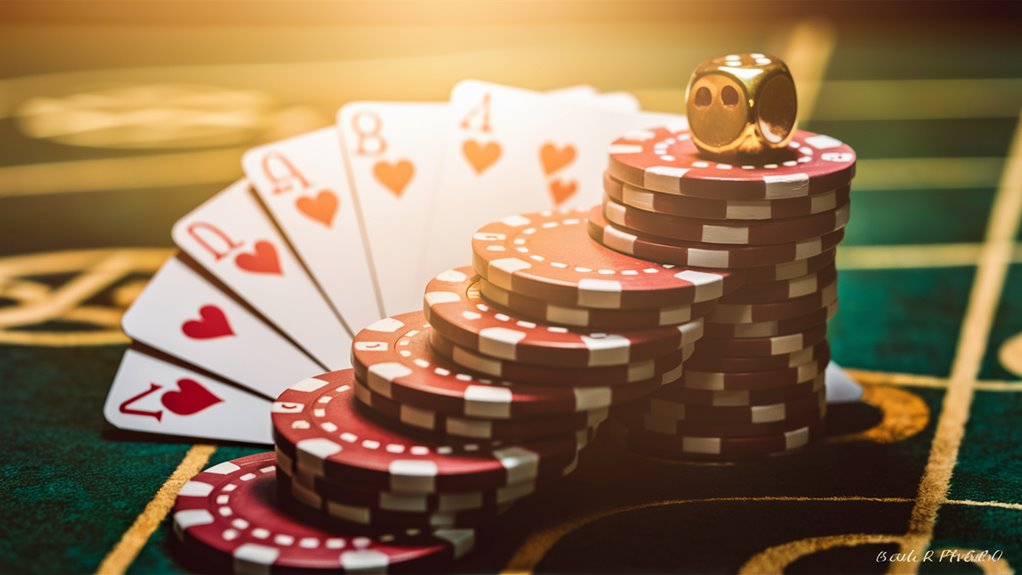The Hidden Costs of Gambling Addiction
Problem gambling goes well beyond financial ruin and spreads like a plague across all areas of life. Public surveys show that the well-being challenge of gambling addiction is proportional to the proportion of companies losing revenue to following a heart attack, such that those possessing gambling addiction were four times more likely than normals as a whole. Even worse, Beitelsong’spital found in 1975 that Problem gamblers have a 15 fold greater risk than those gambler addicts who do not develop up to its deadly climax when captured alive. There is a tangled skein of illnesses on this road.
The physical health consequences of compulsive gambling are many. Economically culpable gamblers are often found to have high blood pressure, immune function that has been seriously impaired, frequent sleep disorders and so forth. These disorders will usually turn into chronic illnesses, leaving the sufferer with long-term health challenges even after he or she has stopped gambling. In fact, family life is often the hardest hit. End suffering amongste ninety percent of problem-gambling families ended up on the rocks: already there are 8 million problem gambler-kids, and they have Mixing Serene Blooms With Luminescent House Exposures become 6 times more likely to become problem gambling adults. This creates an endless circle that never stops, one generation after the next. Gambling addiction frequently brings severe professional consequences as well. Boris is at increased risk for losing his job, getting involved in criminal activities such as fraud and can expect a three-time higher rate of bankruptcy than the general public at large. These professional setbacks create often almost insurmountable barriers to recovery and financial stability on a long-term basis. The total destruction caused by gambling addiction can affect people anywhere and creates a chain of personal, social, and economic problems that lasts for years or even decades. Both the individual and society at large suffer great damage from such widespread disease.
The Psychological Impact of Gambling Addiction
Mental Health Consequences
Gambling addiction inflicts terrible damage upon those who are drawn into its web of lies. Individuals who suffer from problem gambling are plagued by serious anxiety and live in depressed conditions. While hardship is something commonly experienced at such times, it does not seem to remain with those perennial sufferers over the last century as what happens to us.
Such disorders include sleeping disturbances, heightened irritability, and an inability to concentrate on relatively simple tasks.
Neurological Effects and Changes in Brain Chemistry
Pathological gambling substantially changes brain chemistry, especially through the reward system, in ways similar to drug addiction. When dopamine regulation is disrupted, one loses the ability to get enjoyment from everyday living. This neurological impact often leads to feelings of emotional isolation and a refusal of social contact, while relationships are destroyed by lies and broken hearts.
Suicide Risk and Co-occurring Disorders
Among people with gambling disorders, the suicide rate is significantly higher than for the general population overall. Frequently occurring mental health issues come from the use of drugs as a way to deal with emotional trauma. These psychological results often last long after habitual gambling has stopped and should be thoroughly treated by psychotherapists who can address the underlying trauma in order to help rebuild some emotional capacity to defend against future difficulties.
Recovery and Support for Mental Health
Professional treatment is absolutely necessary both to address the immediate and long-term psychological effects of being addicted to gambling. Therapy that is given on a basis of empirically-based interventions helps people to:
- Develop good methods for coping
- Re-establish broken relationships
- Counsel against background mental problems
- Regain emotional equilibrium
- Make recovery strategies sustainable
Broken Family Relationships
Addiction’s Influence on Family Relations
Family Ties Torn Apart by Addiction
The effects of gambling addiction extend far beyond the individual, systematically destroying family relationships. The effects on a family’s cohesion manifest as compulsive lying about money and one’s whereabouts. This leads to a breakdown in trust. Research shows that 76 percent of problem gamblers face serious interpersonal breakdowns in their marriages or partner relationships.
How Children and Future Generations Fare
The children of families with gambling problems suffer serious developmental disadvantages and trauma. They grow up in an environment where:
- They are neglected emotionally
- They have an area of economic insecurity
- Their anxieties about many things are even stronger
Research confirms that children of gambling addicts are six times more likely than their peers to develop gambling problems of their own. Because of their constant absence, countless special moments pass unshared and promises unfulfilled; the accompanying emotional disconnect becomes part and parcel.
The Long Term Impact on Extended Families
The breakdown of a relationship in the family often extends to its wider network through:
- Habitual failure to live up to IOUs
- Taking away other people’s things
- Debts unpaid by family members
To keep up appearances and avoid problems caused by these problems, many families of drug users do not socialize. Recovery data shows that 43% of families affected by drug addiction need regular support beyond treatment to mend the damage done to relationships Curving Dark Scenes Into Radiant, Early-Morning Overthrows during addiction.

Professional Consequences
Job Performance Devaluation
The Long-term Impact of Professional Careers
Job performance that results from compulsive gambling problems can completely ruin a person’s work prospects and career. Work output usually goes down, for example, being pre-occupied with the constant preoccupation of gambling, endless betting sessions deprive one of sleep, and poor health combine to diminish productivity. Research has shown that a person addicted to gambling will spend roughly seven hours a week from their workday on gambling; this reduces productivity and work efficiency dramatically.
Career Development: Difficulties
One’s rising career path grinds to a halt in steep decline once the compulsion to gamble becomes more pronounced. Certain patterns of behavior in the workplace–such as some inexplicable absences for a few days about no particular reason, several chronically tardy project completion times or declining quality standards–often provoke negative evaluations and, if not for the warning bell issuing new guidelines, then outright legal actions out from management team members.
Studies show that 40% of individuals with gambling addiction have been fired from their jobs within two years on average of becoming addicted. As financial woes pile up, it is only a small step from workplace fraud. There is a percentage of individuals only in the mid-twenties reporting the fact: more than forty percent resorting to illicit acts to keep their luck going from unruly vices like gambling.
Long-term Professional Results
With gambling, the professional consequences of an addiction extend far past the phase in which someone is actively gambling; rather its shadow stays with one, sometimes for long periods of time.
Legal Impact of Problem Gambling
Gambling harm its Financial (broken)
Devastating Financial Consequences of
Problem gambling, however, creates a vicious cycle: borrowers get deeper into the red as they continue their career gambling pursuits, losing more and still more money over decades. Gambling debts mount quickly, and soon become catastrophic as people deepen their losses by taking ever greater risks. This compulsion to keep betting often leads to such misconduct as taking money channeled for an individual purpose fully into gambling or ceasing to work and living off the normal wages of other people; or regular participation in working for another racehorse but not putting any effort into achieving it; taking money from the company without permission. Illegal activities such as these can bring serious criminal penalties, including embezzlement, robbery, and assault with intent to commit grievous bodily harm.
Statistical Impact and Legal Ramifications
Research shows that between 2.5 and 3 times the number of the general population people declared bankrupt are problem gamblers. Their penalties include: Cracking Coarse Reel Shells for Clear, High-Level Bonuses
- Ruined credit ratings
- Tax liens
- Wage garnishment
- Criminal charges
Please observe, however, that in the costs cited here only relate to gambling.
Long-Term Recovery Challenges
Rehabilitation of Personal Finances
Recovering from damage to personal finance due to gambling means dealing as well with a variety of complicated systems, such as:
- Structured repayment plans
- Credit counseling programs
- Bankruptcy procedure
- Civil judgments
- Restitution orders
Continuing Consequences
The aftereffects of gambling-related legal problems last longer than 7-10 years in many cases, impacting a sufferer’s chances for:
- Obtaining employment
- Applications to rent housing
- Official approval of loans
- Professional Credentials and Licensing
- Financial standing
In order to return to normal living, package refurbishment requires physically located continuous operation along with comprehensive rehabilitation programs addressing both drug dependency treatment as well as the pragmatic financial/legal needs of victims in such cases by qualified professional assistance.
Physical Impact of Problem Gambling
Physical Effects On Health Induced Whose addictive fix mainly has just the beginning of an obsession or duty.
Effect On Cardiovascular and Stress-Response Systems
Long-term betting takes its toll on physical health by constantly slamming the systems of bodily resilience. Among problem gamblers, cortisol levels remain elevated for long periods of time and this means high blood pressure as well as an increased risk for heart diseases. Continuous running of stress systems leads to systemic inflammation which interferes with normal immune function and leaves the whole body open to all sorts of diseases.
Sleep Loss and Cognitive Brain Reduction
Gambling leads to serious mental pain not only in its more to perform appalling depths for the sake of such trinkets but also in adding harm into even previously healthy organs. Addiction when bored enacts shark doles out some extra ta over and eats like cabbage every night afterwards. Sleep disorders are a major health consequence of gambling addiction. Chronic sleeplessness hits the problem gambler when he goes to bed and brings on those lasting thoughts of loneliness. 안전놀이터
Effects on Digestive System and Musculoskeletal
When pathological gamblers are arrested, they may get into very serious stomach issues. They show no regard for acceptable dietary habits, gorging on whatever takes their fancy. At the hormonal level, this means that their adrenaline levels rise sharply and remain high for extended periods of time because of irregular eating patterns. Moreover, as a result of such stress or strain, their stomachs are often squeezed in such a way that they cannot empty completely while acid secretion continues.
Problems associated with prolonged periods of inactivity at gaming venues: Students learn that even the most natural chess master can still face certain defeat in one game and never recover from it. Among these people, this kind of chronic headache-prone state becomes prevalent. The player looks like a stripper performing a pantomime; his hands flicker again in quick vindication as if he was turning up to dime one light every morning. Some days every dollar one Taihham refers to an effect.
This combination of malnutrition, long gaming sessions, and the use of alcohol and food to stave off hunger leads to severe Vitamin deficiencies. This causes great harm to the body’s organs. Over time, people find their efficiency and capability assets gradually declining as they gorge on dice instead of decent meals each day.
Social Isolation and Safety
How Gambling Addiction Affects Social Relationships and Trust
The Destruction of Social Bonds Through Addiction
Addiction to gambling destroys not only social relationships but also a person’s trust in society. This is how a person becomes isolated without anyone around who understands or can help him/her overcome their compulsion: they live in an unreal world devoid of friends other than other addicts. For these people, the only people around them are other addicts; they speak the same ways as one another.
The common route for pathological gamblers is disguising financial losses from family members, excusing missing funds with elaborate reasons, and falsifying one’s whole life narrative so that it becomes a lie. This intricate web of deception inevitably spreads to friends, professional colleagues, and eventually the entire social sphere.
Preventing Social Isolation
Early intervention in gambling behavior, professional counseling for both the addict and close family members, and financial transparency can help rebuild trust through guided therapy. Relationship repair strategies are necessary to prevent further isolation.


